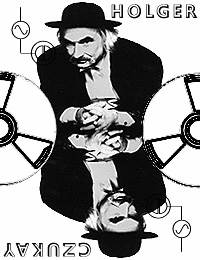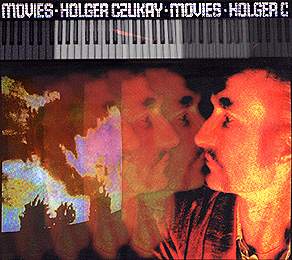D>Elektro 1.2 - |> expanded concept <|
|> Experiments | Sounds + Concepts |
| "I regard it as an insult to be labeled a musician. I see myself as a composer - a kind of archictect of cut-up's and collage's." |
And those experimental travellers brought ever more new, unheard-of Sound-discoveries with them from their electronic expeditiions.
Now it was about time to develop intelligent and creative travel-routes and to combine / connect the sound-treasures that had been found along the way.
| "Faust
were deconstructing the nuts, bolts and griders of rock music through
relentlessly
monotonous pieces and laying the groundwork for today's sampler-collagists
through their intricate tape cut-ups and splices."
Andy Gill - MOJO magazine, April '97
|
CAN, as a group with a breathtaking proliferation of styles and approaches, that developed it's material out of experimentation, improvisations / 'spontaneous compositions', were absolutely depending on the re-structuring of the loads of ideas and material that they had recorded.
The material had to be condensed, edited, mixed and layered to fit it onto the given album-format - without losing it's power and particular open CAN-character.
 Czukay, by developing
his very own cutting- and mixing-techniques, was pushing these procedures
towards perfection. He
let those spontaneously composed elements talk to each other anew through
his way of editing and mixing them together.
Czukay, by developing
his very own cutting- and mixing-techniques, was pushing these procedures
towards perfection. He
let those spontaneously composed elements talk to each other anew through
his way of editing and mixing them together.
The original recording-tapes were cut up in many pieces, layered, manipulated and collaged.
Eventually, this work itself, through it's radical re-structuring of the raw-material, became a
true part of the process of compostion.
| "I
was composing with the same technique, which a cutter applies when
editing films. The mixed down music was cut in 'bits' and put together
again, as a computer does. The result is something, that simply didn't
exist before. It's calculated ['computed'] or, better said: assembled,
'composed' music. Those separated molecules are assembled again artificially. Artificial in the sense of: possibly, hopefully better than the original."
Holger Czukay
|
In the course of his work, Czukay almost "by the way" pre-invented in mechanical / analogue form the today omnipresent sampling. That digital soundtool, without which contemporary electronic would be unthinkable.
| "For
every sound-engineer my recording-methods for 'Movies' and my other
solo-albums would have been something very unusual. In the beginning I had worked on the recordings on my tape-recorder at home. Then I was using a reel-to-reel, then 3 reel-to-reels. When I was preparing the final tapes I transferred them to a 16-track machine and from this onto the computer-mixing-board. For 'Persian Love' I had - with the help of a short-wave receiver - stolen the voice of a persian poet. In 'Hollywood Symphony' I winked a few times towards Diana Ross. All in all I have processed many thousand hours of music for that record. Sometimes I had recorded a couple of hours and kept only a few seconds of them - for instance from a Korean orchestra."
Holger Czukay
|

Especially through the usage of found sounds- and music-material in combination with his own editing- and mixing-techniques, it was never a problem for Czukay to play 'solo' - because the machines were his assistants, his musical 'play-mates'.
|
"Musician's only have two hands. Tape-machines supply me with more than two hands.
I believe, if I would ask the recording-machine to bring me a cup of coffee, than it would do that."
Holger Czukay
|
| D>Elektro |1.2.2| |>Sounds + Elements<| |
| |> Machine | Play | Samples <| |
| |>..Sounds + Elements..|> | |
| <| Rwd: | Studio | Sound | Laboratory | | |
| |> Fwd: | Man | Machine | Communication | |